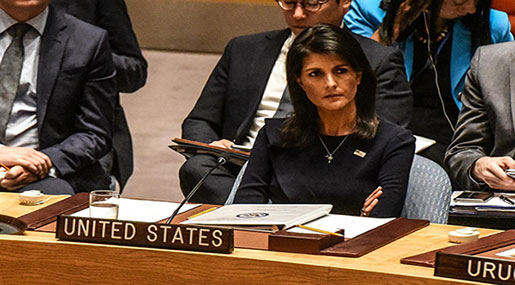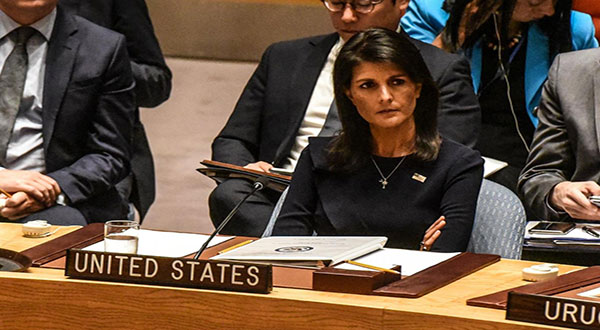
The US Has More Bark than Bite When It Comes to North Korea

Kim Sengupta
From the threat to smite with "fire and fury likes of which the world has never seen" to being forced to climb down on the much heralded "super-tough" sanctions on Pyongyang at the UN, the policy of Donald Trump's administration on North Korea continues on its confusing course.

In order to avoid vetoes by Russia and China at the Security Council, the US had to dilute a whole series of proposed punitive measures. An oil embargo which would have caused serious problems for Pyongyang has been replaced by a plan to reduce oil exports to the country in the future. Proposed restrictions on North Koreans working abroad - an important source of foreign exchange - have been ditched as has a naval blockade to ensure that existing UN sanctions are being enforced. Even the supposed assets freeze on Kim Jong-un, portrayed as the pantomime villain of the piece, and his cronies, has been dropped.
It is ironic that it was Nikki Haley who had to acquiesce to these concessions. She had been matching Trump on aggressive rhetoric ever since being appointed America's UN envoy, with not a week going by without her warning of dire consequences to adversaries, be they Russia, China, the al-Assad regime in Syria and, of course, North Korea.
As it happens, the sanctions adopted at the UN are stronger than those before with some additional steps such as the prohibition on sales of natural gas to Pyongyang. But the hyperbole previously used by Haley has meant that what came is viewed as a setback for Washington. It was interesting to hear the change in Haley's tone. Last week North Korea was "begging for war". On Monday it became the much more emollient: "If it [North Korea] agrees to stop its nuclear program it can reclaim its future. If it proves it can live in peace, the world can live in peace with it."
Pyongyang, which has matched Trump threat for threat, declared that new sanctions will lead to "forthcoming measures to be taken which will cause the US the greatest pain and suffering it has ever gone through in its entire history" without specifying what form this would take. It did not carry out another test at the weekend, as had been expected. Instead, perhaps told about the watering down of the UN sanctions by his Chinese allies, Kim Jong-un held a party for senior figures involved in his nuclear program. This was not the first time that he had wrong-footed his foes - the much publicized supposed firing of missile towards Guam last month did not take place either.
North Korea's leader appears to be safe for the time being. After all, Muammar Gaddafi is unlikely to have been toppled and lynched if he had not given up his weapons of mass destruction in the hope of better relations with the West. And Saddam Hussein may not have ended up in the hangman's noose if he actually had actually kept his WMDs, rather than that being an invention by people around George W Bush and Tony Blair.
I recall seeing Gaddafi's body, along with that of his son Mutassim, lying on the floor of a meat warehouse in Misrata and also covering Saddam's trial in Baghdad which ended with the death sentence. One suspects that Kim Jong-un's nuclear arsenal and missiles will ensure that he does not meet the lethal fate of his fellow dictators.
As the prospect of a Korean conflict receded further and the damage from the hurricanes in the US did not have the worst impact feared, share prices rose internationally. There was a further boost when South Korea's foreign minister, Kang Kyung-wha, stated that despite some reports to the contrary, Seoul has not discussed stationing nuclear missiles on its land with the US administration.
The military options against North Korea's regime are limited and none are without risk, as James Mattis and Rex Tillerson has been pointing out to Congress privately for the last few weeks even as Trump talked about the "new and beautiful equipment" which was supposedly being delivered to the US military each day and could, if necessary, be used against Pyongyang.
In particular the ‘Defense' Secretary and Secretary of State stressed that extensive air strikes would not guarantee hitting all the regime's missiles and nuclear warheads while Pyongyang could wreak devastation on the South with just its conventional weapons. A land offensive against the Peoples' Army of a million troops as well as six million reserves and paramilitary would need a bigger operation than one for the Iraq invasion.
There are, nevertheless, some military repercussions to the crisis. Both South Korea and Japan will both be upgrading its military. Seoul acknowledged that it has gaps in its countermeasures against the North's missiles, with or without the American THAAD deployment. One answer may be to buy an upgraded version of Patriot, which Japan already possesses. In Tokyo, Shinzo Abe will be helped in his mission of changing the mind set of pacifism enshrined in the Japanese constitution since the Second World War. The country's defense budget has increased for the sixth year running.
This is great news for Trump, who has his own mission of expanding US arms exports as he volubly declared in Saudi Arabia during his first trip to the Middle East as President. He has stated on Twitter that he is in favor of Japan and South Korea buying "substantially increased amount of highly sophisticated equipment from the United States". The White House subsequently announced that "billions of dollars" of arms could be involved.
The weaponry, however, is viewed as deterrence rather than for offence. As we have seen, Russia and China are not going to agree to tougher sanctions. These would not be effective, held Vladimir Putin, as "They will rather eat grass than give up their nuclear program unless they feel safe". He presumably meant that Kim Jong-un would be prepared to let his people eat grass rather than take up that diet for himself and his cronies.
There is a general acceptance that talks need to take place. The North Koreans have, for long, wanted bilateral ones with the Americans, something Washington and its allies have steadfastly refused, holding that doing so would be rewarding bad behavior. There are calls for a regional conference and that seems to make sense. But Moscow, and in particular Beijing, need to ensure that Pyongyang starts to negotiate seriously with the international community. Trump needs to desist from colorful threats of annihilation. Making them, and then failing to act, will further embolden Kim Jong-un.
Source: The Independent, Edited by website team
Comments



